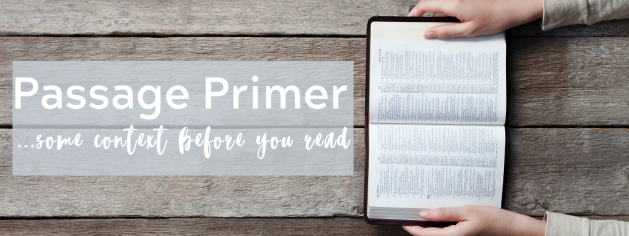
Beginning next week Backstory will be ‘Passage Primer’ with the goal of providing you with context before you journey into the weekly readings. Passage Primer will also be located at a different site (check your email next week).

for 01.05.20
Readings
Jeremiah 31:7-14 • Psalm 147:12-20 • Ephesians 1:3-14 • John 1:(1-18
Passage Primer
Jeremiah 31:7-14
This passage most likely takes place about six centuries before the birth of Christ. It was a time of severe doom and gloom. Jeremiah, and Isaiah before him, had each spent most of their lives calling on the people to return to God, warning them of the oncoming disaster if they failed to do so. They did not return to God and those warnings have came to pass. The city of Jerusalem, the country of Judah, and even the temple of God had been conquered, defeated, and destroyed. Most of the people had been exiled and were now living in Babylon or in refugee and migrant camps. The people were now slaves. They had been scattered, the world as they knew it had come to an end, and there seemed to be no hope in sight. In this prophesy from Jeremiah bringing the people back to hope. His message promises a light in the midst of their darkness, that they will return home, be reunited with each other, and will permit God to be their shepherd.
Psalm 147:12-20 (responsive reading)
The final five Psalms in the book of Psalms are frequently called the ‘Praise the Lord’ psalms as they each begin and end with the words ‘Praise the Lord’. This particular passage in the Psalms, verses 12-20 in chapter 147, bring the connection of creation and salvation into focus. The psalmist uses many aspects of God’s creation to point to God’s creation through Jesus. Later, in another of our readings for this week, we see the writer of the gospel of John also use the thread between creation and salvation.
Ephesians 1:3-14
In Paul’s letter to the Ephesians he emphasizes the oneness that exists between all believers, Jews and Gentiles. The focus is on the adoption of believers as children of God instead of a person’s human nationality or and aspect of our human birth. The walls that divided the Jews and the Gentiles have been torn down and no longer exist. The message is of unity rather than division, the accomplishment of Christ rather that the works of man, the commonality of believers rather than the elements of division rather than the grace of God.
John 1:1-18
In the accounts of Jesus birth in the gospels of Matthew and Luke we are given a chronological account from the message to Mary to the escape to Egypt. The account in Matthew actually goes further back by beginning with the lineage of Joseph that dates back to Abraham. The account in the gospel of John, however, does not use places or dates, it is actually presents the gift of Jesus in a very timeless manner. John shares a great deal of theology as he details God’s gift to mankind of grace. The existence of Jesus at creation, the fact that he is God’s truth, and the existence of a darkness that only Jesus can penetrate is all part of this ‘birth’ account. Although the entirety of the book of John is not written in this literary manner the set up of darkness and truth is a thread that lays a foundation for the message of Christ’s life.